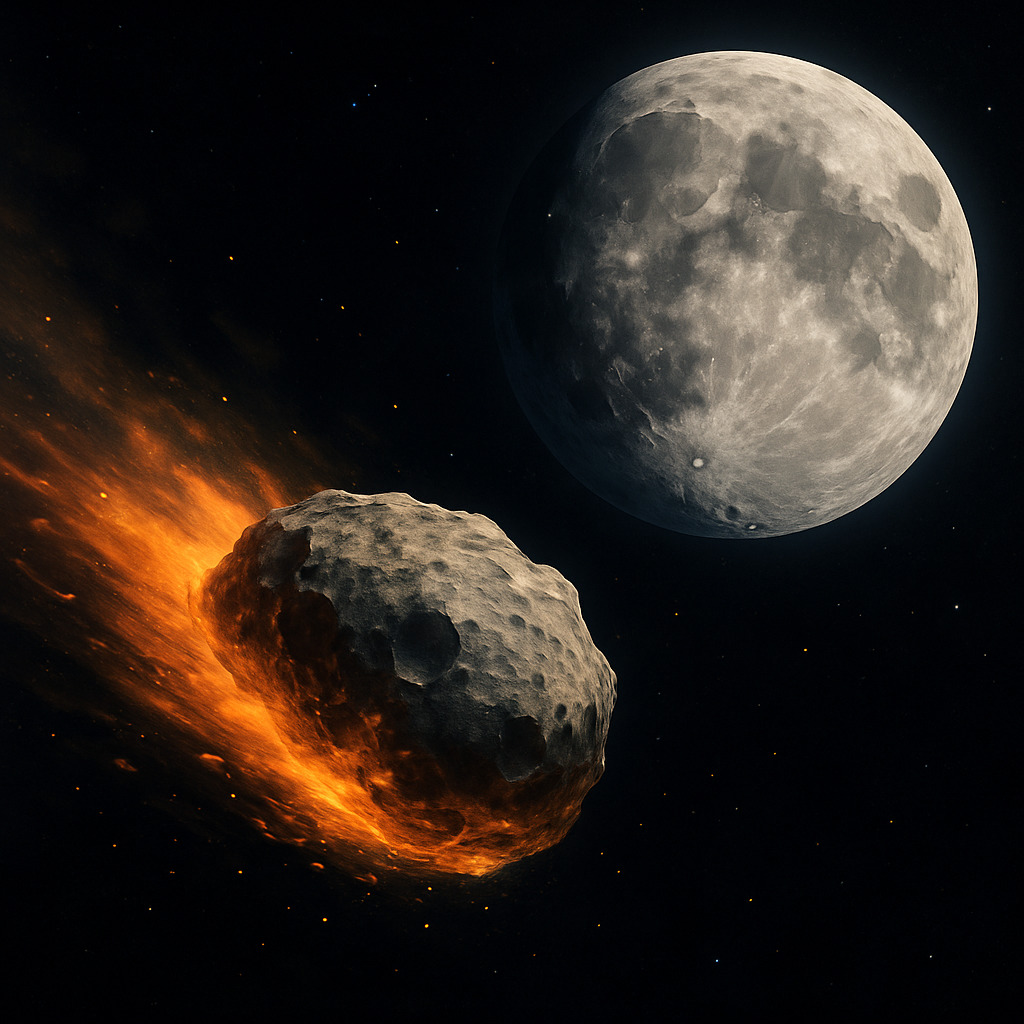🔭 A 60-Meter Cosmic Projectile
It’s called asteroid 2024 YR4, discovered in December 2024. It measures between 53 and 67 meters in diameter—roughly the height of a 15-story building. Classified as a Near-Earth Object (NEO) of the Apollo type, it's a wandering rock that orbits close to Earth, but usually without threatening it.
It rotates on its axis every 19.5 minutes, consists of silicate-rich rocks (likely S- or K-type), and moves through space at over 30,000 km/h. Not exactly harmless.
🌕 Real Risk: Impact with the Moon
Updated predictions as of June 2025 show a 4.3% probability that asteroid 2024 YR4 could hit the Moon on December 22, 2032.
If it does, the resulting crater could measure between 800 meters and 1 kilometer, possibly visible from Earth with amateur telescopes—or even with the naked eye in ideal conditions. It would be one of the most spectacular lunar impacts ever witnessed.
🌍 Could It Affect Earth?
Even though 2024 YR4 won’t strike Earth, a lunar impact could still have indirect consequences here on our planet. Here’s how:
1. Orbital Debris Rain
An impact could eject high-speed debris from the Moon’s surface. Some fragments might escape lunar gravity and enter Earth orbit, posing a threat to satellites, telescopes, and orbital infrastructure.
2. Communications Domino Effect
A single collision with an active satellite can trigger a Kessler Syndrome—a cascading chain of collisions in low Earth orbit. This could cripple GPS, satellite internet, weather forecasting, and global communications.
3. Threat to the Space Station
The International Space Station (ISS) could be endangered by incoming fragments, leading to emergency procedures, mission delays, or equipment damage.
☄️ What If It Hit Earth?
Just to be clear: asteroid 2024 YR4 will not hit Earth. But let’s explore a hypothetical scenario: what if it did?
💥 Estimated Impact Energy
If 2024 YR4 were to crash into Earth at about 8.4 km/s, it would release:
5 to 10 megatons of TNT-equivalent energy
For reference:
- Chelyabinsk event (2013): ~500 kilotons
- Tunguska event (1908): ~10–15 megatons
- Hiroshima bomb: ~15 kilotons
📍 Earth Impact Effects
If it struck a populated area:
- Total destruction within a 3–5 km radius
- Shockwaves breaking windows up to 15–20 km
- Localized fires and vibrations
- Small tsunami if it hit water
It wouldn’t trigger a mass extinction, but it could obliterate a city in seconds.
🗓 When Will We See It Again?
After its initial discovery, 2024 YR4 became unobservable from Earth. It will become visible again in December 2028, offering a chance to update its trajectory and refine risk calculations for 2032.
🌌 Conclusion
Asteroid 2024 YR4 is not a global threat, but it serves as a reminder: space is dynamic, and Earth is fragile. A potential impact on the Moon might not cause panic, but it could disrupt the infrastructure we rely on every day.
It's not the end of the world—but it could definitely be the start of some very expensive damage above our heads.








Leave a Comment